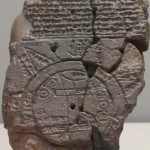Not a few critics of the Bible have called into question not just the religion, but the deity connected to the religion. Not the least of the issues raised concerns the quality of morality in the Old Testament. Paul Copan, in Is God a Moral Monster?: Making Sense of the Old Testament God, examines this issue in a general way in chp 6, and so today we want to discuss — notice the topic — the general approach to dealing with Old Testament moral issues.
 But we need something concrete to think with, so we could take slavery, which isn’t forbidden; or we could take the law to put someone to death for working on the Sabbath (Exod 35:2) — or asking what in the world is so bad about shellfish. The issues involve patriarchal structures, primogeniture, warfare, servitude, … etc..
But we need something concrete to think with, so we could take slavery, which isn’t forbidden; or we could take the law to put someone to death for working on the Sabbath (Exod 35:2) — or asking what in the world is so bad about shellfish. The issues involve patriarchal structures, primogeniture, warfare, servitude, … etc..
How do you — in general — look at the laws of the Old Testament?
Copan proposes an essential redemptive movement approach, but he has a variety of terms and ideas through which he states his case — and once we get the more general approach settled, we can deal with some particular issues (chps. 7 and following).
Thus, he sees the Old Testament as “inferior and provisional” – and here he contends the OT law was never to be permanent but a “temporary measure that was less than ideal.” Quoting NT Wright, he observes that the Law was “given for a specific time, and is then set aside” (60).
How does God face those fallen conditions? “He met Israel partway.” And here he develops the idea that God revealed incremental steps toward the ideal.God is patient and humans are broken — so the laws are incremental. But Copan’s approach is not the same as William Webb’s for Copan sees major ideals already in Genesis 1–2 and that from that point on there is a fallen creature who gradually is given higher and higher ideals until the New Testament, and in the NT we see an ethic that can realize again the conditions of Genesis 1–2.
Furthermore, Paul Copan makes another point: the “is” of the Old Testament figures is not necessarily an “ought.” Just because David was corrupt doesn’t mean God condones corruption. The figures are cracked Eikons in need of major repair.
So back to our question: How do you approach the moral laws of the Old Testament — in general?











